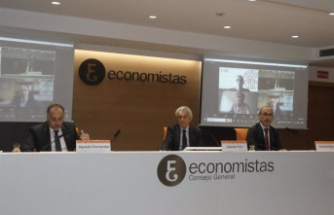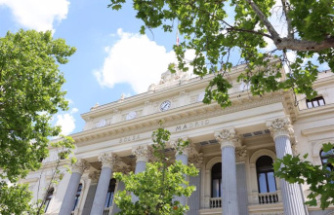Author of some forty books translated and awarded worldwide, the French author and illustrator Benjamin Lacombe was inspired by his own experience of sudden blindness, following a trauma, to imagine his new album, Blindness Malaga. It tells the story of a young blind tightrope walker, adored by the public, who carries within her a legendary destiny. The book with its unique visual effects echoes the concept of resilience.
The experience lived by Benjamin Lacombe, an extremely talented artist, whose work is recognized throughout the planet, deserves to be known to the general public. Three years ago, following bereavement and too much pain, he lost his sight for a few hours. This phenomenon is called cortical blindness.
Learning of the sudden death of his friend and editor for several years, Françoise Mateu, caused intense shock and, for a few hours, Benjamin Lacombe lost his sight.
"It was very hard and this is the first time I've spoken about it. I have dedicated many books to him. It's rare and difficult to have someone who is your reader, in whom you trust in the gaze and in the feedback, in benevolence. It’s complicated especially for the texts, I find”, he shares, in an interview.
“When you write texts, there is a part of self-disclosure. When she left, it was a part of me that left at the same time with her because I no longer had that look, that listening. It was difficult because I loved her very much and I had a very strong relationship with her, but also artistically, it was a loss. It was tough and it still is."
The shock was intense. "I didn't even know it was possible. It was a difficult period. I lost Françoise and I also lost my dog, who had been my companion for 13 years. These two simultaneous disappearances gave me a series of physical problems.”
“I had stress that created toxins in my body and it paralyzed my entire left side. At that time, I was preparing for an exhibition that was to take place and since it was the left side and I am right-handed, I continued to draw, as if nothing had happened.
“One morning, I saw no more. And there, it was terrible because I could no longer work at all. And above all, it was a terrible panic and terror. I had no idea that stress could lead to such extremes on a physical level.”
Resilience and art
He translates these issues into the story of Cécité Malaga, in the book, who suffers a trauma and finds a way to overcome a drama. On the aesthetic level, Benjamin Lacombe translates what is produced by different techniques, layer and varnish effects, different visual effects. The effect is spectacular.
“You have to realize what you already have and what you can transform from all that. Basically, the trials of life, they are there, we can not do anything about it. We will live with it. We experience losses all the time. But you have to live with what you have and transform all that. This is what this book says, in truth: we must not take the things of life as ends in themselves. These are journeys and transformations.”
Benjamin Lacombe took drama into art and made something wonderful out of it. "That's the role of artists." He gives examples of artists like Frida Kahlo and Leonardo da Vinci, who also created in the aftermath of tragedies.
“I remain convinced that great artists are always born of cracks. Still."
♦ Benjamin Lacombe has developed a rich and inventive artistic practice: painting, black stone, volume, scenography, creation of patterns for textiles and objects.
♦ He is the author of around forty books that have been translated and awarded prizes throughout the world.
♦ He directs the Classiques illustrées collection at Albin Michel and has notably published Frida and Madame Butterfly.













